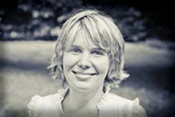
The CSE Colloquium Series will present Yuliya Lierler on Tuesday, February 26 from 4 - 5 p.m. in 115 Avery. Lierler is an Assistant Professor at University of Nebraska Omaha and will present "Answer Set Programming for a Tight Integration of Syntactic Parsing with Semantic Disambiguation". The talk will be preceded by a reception at 3:30 p.m. in 348 Avery.
Abstract:
Answer set programming (ASP) is an advanced declarative programming paradigm stemming from knowledge representation and reasoning formalism based on the answer set semantics of logic programs. In the first part of the talk we introduce this paradigm. In the second one, we talk about an application of ASP to the field of natural language processing, in particular, to parsing.
The task of parsing -- recovering the internal syntactic structure of sentences -- is an important task in natural language processing. Combinatory categorial grammar (CCG) is one of the grammar formalisms that are used for natural language parsing. We propose and implement a new approach to CCG parsing that relies on answer set programming: the tool ASPCCGtk is available at http://www.kr.tuwien.ac.at/staff/former_staff/ps/aspccgtk/
A common assumption in the design of parsers is that syntax and semantics of language are independent. On one hand, this allows researchers an abstraction necessary to promote substantial steps forward. On the other hand, constraints stemming from semantic information carried by words are frequently needed to disambiguate syntactic structures corresponding to sentences. We propose and advocate a method for incorporating semantic information from FRAMENET, lexical database of English, into syntactic parsing to allow semantic-based disambiguation of syntactic structures. We implement these ideas in ASPCCGtk.
Biography:
Lierler is an assistant professor in Computer Science Department in College of Information Science and Technology at University of Nebraska-Omaha, where she has been since 2012. She completed her Ph.D. in Computer Science at the University of Texas at Austin in 2010. She served as a Computing Innovation Fellow Postdoc in Computer Science Department at the University of Kentucky until 2012. Her research interests are in the field of artificial intelligence, especially in the area of knowledge representation, automated reasoning, declarative problem solving, and natural language understanding.